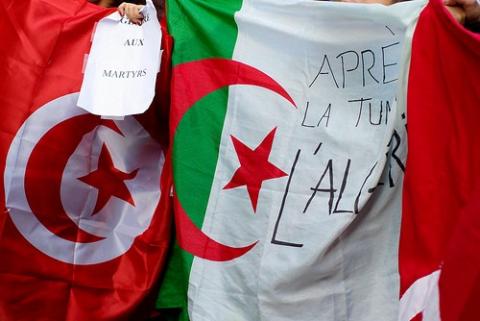And now for Algeria?

While Tunisia was rising and Egypt was roaring, courageous people in other countries started to challenge their own regimes, on the streets or via social media. There was protest in Yemen, Syria, Morocco, Libya and Algeria. Where will the spotlight of revolution fall next? By Amel Yacef
It seems that the success of Tunisia and Egypt in turning the tables on their governments could put pressure on young people in other Arab states to launch their own revolution. But at what price?
All the countries in the region suffer from the one-and-almighty regime syndrome which is not far short of controlling the air its people breathe. But each nation has its own past, and each regime has its own despotic systems, often intricately woven into the very core of society.
On the very day Egyptians woke to a country free of Mubarak, thousands of Algerians responded to the call of the Coordination national pour le changement et la democratie (National Coordination for Change and Democracy). This is a grouping of opposition parties, the human rights league, unions and civil society organisations. When they attempted to march, protesters were met by 30,000 police officers in Algiers alone, and thousands more in the various cities and towns across the country. The police proceeded systematically to beat and arrest peaceful protestors. The authorities went to the extent of stationing policewomen to purposely arrest women, whose presence in any public action on the streets in such a country is highly symbolic.
Train and bus stations were closed the day before, main streets in the capital were blocked; any attempt to demonstrate outside Algiers was aborted. It was debatable whether this show of force was a reminder of who rules the roost or a sign that the clay feet of the colossus are beginning to disintegrate.
According to panellists on different news channels, the formula for a successful revolution seems to be the spontaneous popular revolt of the educated, unemployed youth, who are then backed by the wider population, and later by the voice of the opposition, emerging to discuss a transition period and, most importantly, the role of the army.
But even though the ingredients are there, Algeria distinguishes itself in the region with a different structure, starting with the dreaded regime which is the army.
International opinion could acknowledge that revolt has been brewing for a while - or it might, simplistically, be considered the direct result of the Jasmine and Nile revolutions.
Moreover, is any movement instigated by the opposition doomed to fail? A lot of young Algerians are very sceptical of the representatives of that very opposition, and why wouldn't they be: as far as a lot of people are concerned the very fact that the opposition is still standing would prove that they failed miserably at their prime function. Many believe they must have been corrupt one way or another if they are still there: it is common knowledge that anyone who made no concessions in opposing this regime is either in jail, exiled or dead.
Algeria is no stranger to revolution and has always nurtured this notion of the brave. However, deep-running scars haven't healed; too much blood has soaked the land – from the million and a half martyrs of the independence war to the 150,000 victims of the "black years", not to mention the 20,000 missing. It's no surprise that the Algerians are very cautious.
In addition, ethnic, regional and religious divisions and resentments still run high in a country that has to re-learn democracy, acceptance, equality and respect after decades of absolute control and brain washing. For it to work, young people have to take full ownership of their country, a country which has so far been the property of the ruling regime. The absence of that sense of ownership has contributed greatly to the apathy and disheartened attitude of the Algerian people.
One might ask if the Algerians feel under pressure, either external or internal, to deliver the next revolution in the Arab world.
Over 40 new facebook pages have been created in the last few days calling for radical change. Thousands of students have been demonstrating throughout the week. Riots have been exploding in various locations and people are setting themselves on fire in a desperate attempt to have their voices heard. It is probably safe to say that the Algerians have definitely embarked on a journey for change, and have joined the rest of the world in their quest for a better, more equal and more just future.
[Image top via anw.fr on Flickr]
